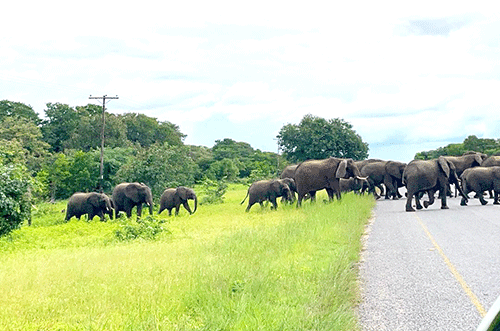As part of conservation efforts, the environment and tourism ministry has allocated hunting quotas for animals adjacent to the Bwabwata National Park and for the Kyaramacan Association members living inside the park.
Currently, these communities, in particular the Khwe (San) of the Kyaramacan Association, survive through wildlife conservation such as community-based tourism, trophy hunting concessions and the harvesting of Devil’s Claw.
The environment and tourism ministry’s spokesperson Romeo Muyunda said there are currently three registered conservancies (Kwandu, Mashi, Mayuni) adjacent to the Bwabwata National Park and the Kyaramacan Association.
The ministry has allocated a three-year conservation hunting quota from 2020 to the three conservancies.
He indicated that 93 animals (including huntable birds) were allocated to the Kwandu conservancy. Similarly, the Mashi conservancy was allocated 96 animals.
A total of 99 animals were allocated to the Mayuni conservancy. Equally, the ministry has allocated a five-year hunting quota (2016 to 2021) to the Kyaramacan Association with 96 animals.
This means 384 wild animals were allocated as hunting quotas to the above-mentioned conservancies combined.
The quota allocations are divided into trophy hunting, own use, and for traditional festivals.
The allocated animals comprise different species like elephants, hippos, crocodiles, lechwe, kudus, impala, duikers, roans, sable and guinea fowls, amongst others.
Since the allocated quotas lapsed, Muyunda explained that the ministry will again from 2022 allocate new hunting quotas to different conservancies.
Additionally, the ministry has awarded four tourism concessions inside the Bwabwata National Park to the conservancies and the Kyaramacan Association for the development and management of tourism activities.
Through these concessions, three joint venture lodges were built. These are the Kazile Lodge for the Mashi Conservancy, Nambwa Lodge for the Mayuni Conservancy, and the White Sand Lodge for the Kyaramacan Association. Collectively, the conservancies and the association have generated over N$47.7 million, of which N$13.2 million went to members’ benefits in the past five years.
Muyunda said funds generated were utilised to implement activities geared towards reducing human-wildlife conflict incidences, biodiversity conservation, and improving the livelihoods of the people.
Communities furthermore benefitted through rural electrification projects, the building of a permanent structure for the traditional authorities, and school classrooms, scholarships, funeral assistance, water provision projects as well as cash to members.
He stated that unfortunately in the Mukwe constituency, the traditional authority leadership and some specific individuals refuse to take advantage of the available livelihood and economic development opportunities, despite the huge potential of the area.
“Offers for tourism concession rights in the Buffalo and Mahango core areas of the Bwabwata National Park were given to the Hambukushu Traditional Authority, as well as the adjacent community. This is on condition that the Hambukushu community establishes a community-based organisation like a conservancy in the western part of the park in accordance with the Nature Conservation Amendment Act, 1996 (Act 5 of 1996). Sadly, these tourism concession offers were not taken up, and the ministry waits for the Hambukushu community in this regard,” Muyunda clarified.
He also touched on the proclamation of the Bwabwata National Park, which stemmed from the then existing legal status of the Caprivi Game Park and the Mahango Game Park, contrary to the views expressed by a few individuals, including the Ombudsman, that the park has no legal status.
Therefore, documentary proof is available in this regard.
“It is worth mentioning that all national parks in the country, except for the Tsau /Khaeb (Sperrgebiet) and Mangetti National Park, were proclaimed in this manner before independence, and such proclamation remains legal. The Bwabwata National Park simply went through a name change by merging the Caprivi Game Park and the Mahango Game Park after public consultation,” he elucidated.
Bwabwata is number one in the country, where access and benefit-sharing are being practised. This includes activities such as the harvesting of Devil’s Claw, hunting of game for own use, conservation hunting, photographic tourism through concessions, and the collection of wild fruits.
–anakale@nepc.com.na


